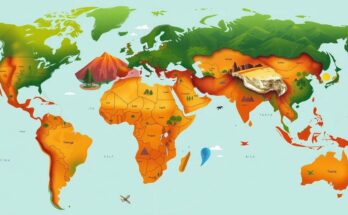Iran has lifted its ban on WhatsApp and Google Play, indicating a possible easing of internet restrictions. This decision follows a meeting led by President Masoud Pezeshkian. Additionally, the Iranian government has paused the implementation of a stricter hijab law amid public protests and international pressure.
Iran has recently lifted its prohibition on accessing WhatsApp and Google Play, signaling a potential relaxation of its stringent internet restrictions. This decision follows a meeting chaired by President Masoud Pezeshkian, where it was determined that there is sufficient support to allow access to these popular platforms. Iran’s communications technology minister highlighted the significance of this action as the initial step towards broader internet freedom in the country. Despite these changes, many Iranians continue to circumvent online censorship using virtual private networks (VPNs) to access blocked social media sites, including Facebook and YouTube.
In conjunction with this development, the Iranian government has also decided to temporarily pause the implementation of a newly approved law mandating stricter hijab regulations for women. This pause comes in light of international pressure and ongoing public dissent against restrictive social policies. The law, designed to impose harsher penalties on women who defy hijab mandates and those who offer services to them, was initially adopted by the parliament but has been halted from further progression at this time, with discussions ongoing regarding its future. This shift is perceived as an attempt by President Pezeshkian to navigate complex domestic and international concerns effectively.
The recent lifting of the ban on WhatsApp and Google Play in Iran signifies a noteworthy shift in the nation’s approach to internet governance. Iran has historically imposed some of the world’s most rigid internet restrictions, which are often circumvented by tech-savvy citizens using VPNs. As global scrutiny intensifies, especially from countries like the United States advocating for digital freedoms, Iranian officials are under pressure to address the grievances of their populace. Furthermore, the reconsideration of the newly adopted hijab law demonstrates the Iranian government’s sensitivity to public opinion and the sociopolitical atmosphere. Stricter regulations on women’s dress codes had faced considerable resistance, culminating in protests that utilized social media for organization and mobilization. The decision to pause the implementation of the hijab law reflects a balancing act by Iranian leadership amid regional and international diplomatic engagements, particularly relating to nuclear discussions.
In summary, the decision by Iran to lift the ban on WhatsApp and Google Play marks a potential shift towards reducing internet censorship, reflecting the influence of public dissent and international pressure. Simultaneously, the pause of the stricter hijab law further illustrates the Iranian government’s awareness of sociocultural dynamics within the country. Both actions may indicate an effort by Iranian leaders to navigate both internal and external challenges while addressing the digital rights and freedoms of their citizens.
Original Source: www.hindustantimes.com




